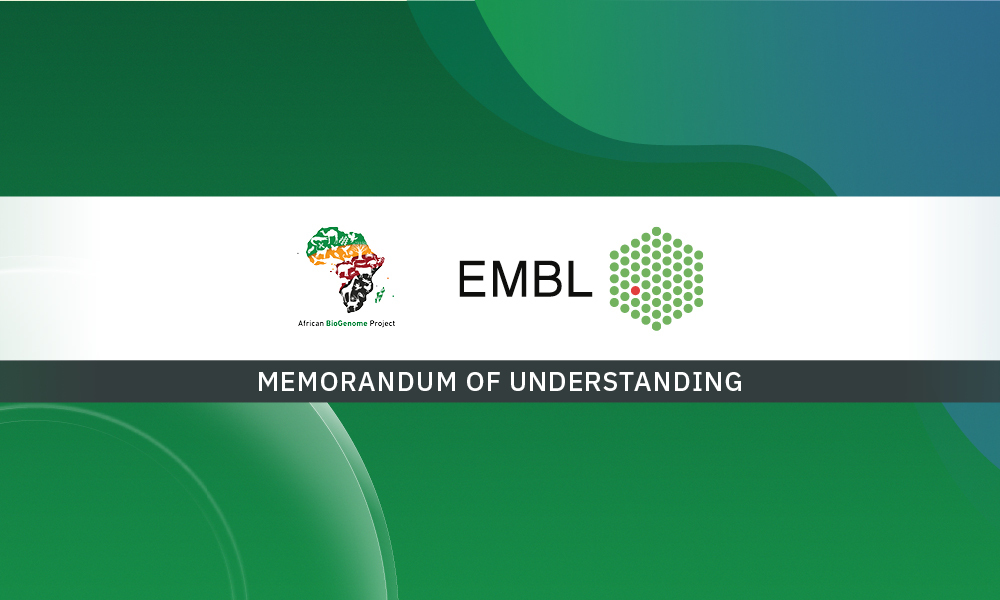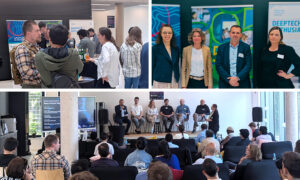
Supporting the African BioGenome Project to build bioinformatics capacity
The African BioGenome Project and EMBL have signed a Memorandum of Understanding to support each other in building genomics and bioinformatics capacity across Africa

The African BioGenome Project (AfricaBP) is an African-led effort to sequence the genomes of all species indigenous to the continent of Africa. It also aims to help build bioinformatics capacity for the researchers working there. The Memorandum of Understanding (MoU) with the European Molecular Biology Laboratory (EMBL) formalises the support that AfricaBP receives from the genome annotation and scientific training specialists in the Ensembl team at EMBL’s European Bioinformatics Institute (EMBL-EBI).
Ensembl plays a leading role in the genome annotation work for many large biodiversity initiatives, including the European Reference Genome Atlas and the Darwin Tree of Life Project. Genome annotations give researchers vital information about the location of a gene in a given genome. Ensembl makes these annotations openly available to their users to help them answer a wide range of biological questions, and understand global biodiversity and ecosystems. This work is also a key pillar in EMBL’s ‘Molecules to Ecosystems’ Programme, specifically the Planetary Biology research theme, which supports research into genetic influences on ecosystems in order to better understand biological processes and improve planetary health.
Driving sustainability through collaboration
By signing this MoU, Ensembl and EMBL-EBI have agreed to support AfricaBP with not only the creation of the annotations generated from the project, but also the co-creation of workshops and training opportunities for African scientists across the continent, with help from their training experts.
“AfricaBP is harnessing the power of genomics for research and development in Africa,” said Appolinaire Djikeng, Co-Chair of AfricaBP, Director of the Centre for Tropical Livestock Genetics and Health, Roslin Institute, and Professor at the University of Edinburgh. “Support from our collaborators such as that which we are receiving from EMBL-EBI is vital for AfricaBP to achieve its mission and in the long term, conserve Africa’s unique biodiversity and drive sustainability on the continent.”
Annotating African species
Africa is rich in biodiversity but is understudied compared to other continents with better funding for genomics research. To help the project achieve its ambitious goals of sequencing all life on the continent and making this data useful and accessible for scientists everywhere, AfricaBP has partnered with EMBL-EBI. The researchers within Ensembl are experts in creating genome annotations and their unrivalled skills in this area of genomics will be invaluable to the goals of AfricaBP.
“AfricaBP has been a great success so far and we are very grateful for the support we have received from our international partners and African organisations. Now we are extremely excited to be receiving this extra support from the Ensembl team at EMBL-EBI,” said ThankGod Ebenezer, Founder and Co-Chair of AfricaBP and Bioinformatician at EMBL-EBI. “AfricaBP is a project that is continuously growing. There are now over 110 African scientists working on this project and this number will keep increasing. So, the support we will receive to help train these scientists through the Ensembl training workshops and other EMBL-EBI workshops is going to be a big help.”
Building bioinformatics capacity in Africa
“The Ensembl Outreach and Training team has visited a number of African universities in recent years to deliver bioinformatics training workshops. Crucially, the EMBL trainers’ travel and workshop costs were fully covered by a Wellcome Open Research Grant, enabling them to deliver 27 in-person workshops over two years, across seven countries and reaching over 700 scientists,” said Peter Harrison, Genome Analysis Team Leader at EMBL-EBI. “Partnering with AfricaBP means we will continue to help support African countries and the scientists involved in the project and help build their capacity to do the sequencing annotation themselves. It’s important that African universities are supported in this project so their scientists can perform these analyses, with the assistance of EMBL staff and facilities, while their own capacity is being developed.”
Collecting, sequencing, and storing genomic information from all species across Africa – by and for the African people – is a fundamental priority for the AfricaBP. One vital goal of the project is to build the skill base required for biodiversity conservation on the continent by supporting African scientists to apply the bioinformatics and genomics techniques needed to do this. This is important for the long-term sustainability of the project.
“It is exciting that the AfricaBP project has begun sequencing a few species indigenous to Africa. Being able to make sense of this data is central and key to the biodiversity conservation effort in Africa,” said Denye Ogeh, Bioinformatician at EMBL-EBI. “It is important that the partnership with Ensembl at EMBL-EBI provides knowledge sharing in the area of automated annotation, training, and workflow development. Giving access to the technical expertise and infrastructural resources here at Ensembl will certainly advance the goals of the AfricaBP while developing and training local capacity.”
Find out more about Planetary Biology research at EMBL as part of the ‘Molecules to Ecosystems’ Programme and about other MoUs signed by EMBL.
Funding
The African BioGenome project has received funding from the University of South Africa (UNISA), Centre for Tropical Livestock Genetics and Health (CTLGH) and Inqaba Biotechnical Industries (Pty) Ltd. Ensembl is supported by the Wellcome Trust [222155/Z/20/Z]; with additional funding for specific project components, including Wellcome Trust [108749/Z/15/A], UKRI and EMBL. In addition, this project has received funding from the European Union’s Horizon 2020 research and innovation programme under grant agreement No733161 (MultipleMS), No 731060 (INFRAVEC2), No 825575 (EJP RD), No 817923 (AQUA-FAANG), No 817998 (GENE-SWitCH) and No 815668 (BovReg).


